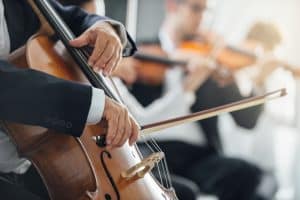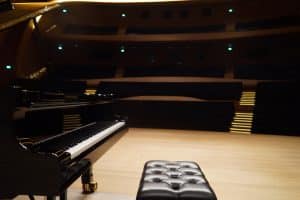Brown Music Program
Brown University offers a vibrant and diverse music program that provides students with a comprehensive understanding of music theory, history, and performance. This article will delve into the various aspects of the Brown University Music Program, including its rich history and opportunities.
Whether you are an aspiring musician or simply interested in exploring the world of music, the Brown University Music Program offers many opportunities for growth and creativity.
Understanding the Brown University Music Program
The Brown University Music Program has a long and illustrious history that has shaped its philosophy and approach to music education. A deeper understanding of this program requires a look into the historical development of music at Brown University and an exploration of its overarching philosophy.
The History of Music at Brown University
Music has been essential to Brown University’s academic offerings since its founding in 1764. From its early days, when music instruction was limited to a few courses, to the present, where the program boasts a comprehensive curriculum, the music program at Brown has continuously evolved to meet its students’ changing needs and interests.
Throughout its history, the program has seen the emergence of influential faculty members who have left a lasting impact on the music community. One such figure is Professor John Brown, a renowned composer and conductor who joined the faculty in the early 1900s. Under his leadership, the music program experienced rapid growth and innovation, introducing new courses and establishing a dedicated music building.
Over the years, the program has also fostered a vibrant musical community on campus. From student-led a cappella groups to jazz ensembles and chamber orchestras, there are countless opportunities for students to engage with music outside the classroom. This rich musical environment has contributed to the program’s reputation as a hub of creativity and collaboration.
The Philosophy of the Music Program
The Brown University Music Program is grounded in the belief that music is an art form and an academic discipline that can transform lives. At its core, the program seeks to provide students with a well-rounded education, combining rigorous intellectual inquiry and hands-on musical practice.
Central to the program’s philosophy is the idea that music is a universal language that transcends cultural boundaries. Students are encouraged to explore diverse musical traditions and styles, gaining a deep appreciation for the richness and diversity of global music. Students develop a broader understanding of the human experience and music’s role in shaping societies by studying music from different cultures and periods.
The program also places a strong emphasis on critical thinking and creative expression. Students are encouraged to question established norms and push the boundaries of musical conventions. Through composition and improvisation workshops, they are given the tools to express their unique artistic voices and contribute to music’s ongoing evolution.
Furthermore, the program recognizes the importance of collaboration in the musical process. Students can work closely with faculty members and fellow musicians, participating in ensemble performances and collaborative projects. This collaborative spirit fosters a sense of community and encourages students to learn from one another, creating a supportive and inspiring environment for musical growth.
The Curriculum of the Music Program
The Brown University Music Program curriculum is designed to provide students with a comprehensive foundation in music theory, history, and performance while allowing specialization in specific areas of interest.
Overview of the Course Structure
The music program offers various courses, from introductory to advanced seminars. Students begin with foundational music theory and history courses, gradually progressing to more specialized topics such as composition, ethnomusicology, and music technology. In addition to coursework, students must participate in ensemble performances and recitals to develop their practical skills.
Specializations within the Music Program
Within the music program, students can focus on specific areas of interest through specialized tracks or concentrations. These include performance, composition, musicology, ethnomusicology, and music technology. These specializations allow students to delve deeper into their chosen area and develop expertise in their field of interest.
Faculty and Staff of the Music Program
The Brown University Music Program boasts a dedicated and accomplished faculty and staff committed to providing students with a stimulating and enriching learning environment.
At the heart of the Music Program at Brown University are the exceptional faculty members who bring a wealth of knowledge and experience to the classroom. These renowned musicians and scholars are passionate about their craft and deeply committed to nurturing the talents of their students. With a diverse range of expertise, the faculty members of the music program at Brown University can offer students a comprehensive education in music.
Among the faculty members are world-class composers who have had their works performed by prestigious orchestras and ensembles. Their compositions are celebrated for their innovation and artistic expression, and students have the unique opportunity to learn from these masters of musical creation.
Additionally, the program is fortunate to have accomplished conductors who have led renowned orchestras and choirs worldwide. Their expertise in interpreting and bringing music to life is invaluable to student development as performers.
Musicology, the study of music history and theory, is another area of specialization within the music program’s faculty. The musicologists at Brown University are respected scholars who have significantly contributed to the field. Their research and expertise give students a deep understanding of the historical and cultural contexts in which music is created and performed.
Of course, the faculty also includes exceptional performers who have graced stages around the globe. These accomplished musicians bring their technical mastery and artistic sensibilities to the classroom, inspiring students to strive for excellence in their performances. Whether it’s a virtuosic violinist or a soulful jazz pianist, the performers on the faculty are dedicated to helping students develop their musical skills and find their unique voice as musicians.
Profiles of Key Faculty Members
The faculty members of the music program at Brown University are renowned musicians and scholars who bring a wealth of knowledge and experience to the classroom. From composers and conductors to musicologists and performers, the faculty members are passionate about sharing their expertise with students and inspiring them to achieve their full potential.
One of the celebrated faculty members is Dr. Emily Dolan. Dr. Dolan, an expert in late Enlightenment and early Romantic music and aesthetics, is an associate professor of music at Harvard University. Before joining Harvard, she was an associate professor of music at the University of Pennsylvania. In 2006, Dolan received her Ph.D. from Cornell University and was awarded the Alvin H. Johnson AMS 50 Dissertation Fellowship by the American Musicology Society. Her research interests include orchestration and instrumentality and the meeting point of music, science, and technology.
Role of the Support Staff
In addition to the faculty, the music program is supported by a team of experienced staff members who play a vital role in ensuring the smooth functioning of the program. From managing administrative tasks to coordinating performances and events, the support staff is instrumental in creating a nurturing and supportive student environment.
The administrative staff members work tirelessly behind the scenes to ensure students have access to the resources they need to succeed. They handle everything from scheduling classes, managing student records, and coordinating auditions and recitals. Their attention to detail and organizational skills are crucial to running the program smoothly.
The technical staff members are responsible for maintaining and managing the program’s extensive collection of musical instruments and equipment. From pianos and percussion instruments to recording and sound equipment, the technical staff ensures that everything is in top condition and readily available for students. They also provide technical support during performances and rehearsals, ensuring optimal sound quality and that all equipment functions correctly.
Lastly, the performance and event coordinators work closely with faculty and students to organize concerts, recitals, and other musical events. They handle all aspects of event planning, from securing venues and arranging logistics to promoting the events and managing ticket sales. Their expertise in event management ensures that performances run smoothly and that students have opportunities to showcase their talents in front of an audience.
Facilities and Resources for Music Students
Brown University is committed to providing music students exceptional facilities and resources to support their artistic and academic growth. These resources are designed to enhance the learning experience and provide students with the tools they need to excel in their musical endeavors.
Music Libraries and Collections
One of the critical resources available to music students at Brown University is the John Hay Library. This renowned library houses an extensive collection of music scores, books, recordings, and digital resources.
Students can access these materials for research and reference purposes, allowing them to explore various musical genres, styles, and historical periods. Whether they study classical compositions, jazz improvisation, or contemporary music, the library’s collection provides knowledge and inspiration.
Within the John Hay Library, music students will find dedicated sections for different musical disciplines, ensuring they can quickly locate the most relevant resources for their studies. From rare manuscripts to contemporary publications, the library’s collection constantly expands to meet the evolving needs of music students.
Practice Rooms and Performance Spaces
In addition to the extensive library resources, the music program at Brown University provides students with dedicated practice rooms equipped with pianos and other instruments. These practice rooms are designed to create an optimal environment for individual and group rehearsals, allowing students to hone their skills and refine their musical techniques.
Furthermore, Brown University boasts a variety of concert halls and performance spaces on campus. These venues allow music students to showcase their talent through recitals, concerts, and collaborative performances.
Whether performing as a soloist or as part of an ensemble, students can access state-of-the-art facilities that enhance their musical performances and create a memorable experience for performers and audience members.
These performance spaces are equipped with top-of-the-line sound systems, acoustics, and lighting, ensuring that every musical performance is of the highest quality. From intimate recitals to grand orchestral performances, these venues provide the perfect backdrop for students to share their musical talents with the Brown University community and beyond.
Additionally, the music program at Brown University regularly hosts masterclasses and workshops, inviting renowned musicians and scholars to share their expertise with students. These events provide invaluable learning opportunities and allow students to gain insights from professionals in the field. Whether attending a lecture on music theory or participating in a hands-on workshop on composition, these events further enrich the educational experience of music students at Brown University.
Opportunities for Performance and Collaboration
One of the most enriching aspects of the Brown University Music Program is the wide range of performance opportunities and collaborative projects available to students.
Student Ensembles and Choirs
The music program offers a variety of student ensembles and choirs where students can develop their performance skills and explore different musical genres. Whether it’s a jazz ensemble, chamber music group, or chorus, these ensembles provide a platform for students to collaborate with their peers and showcase their musical abilities.
Concerts and Recitals at Brown University
Brown University hosts numerous concerts and recitals throughout the academic year, featuring student performers and renowned guest artists. These performances provide students valuable opportunities to experience live music and be inspired by their peers and established musicians’ talent and creativity.
In conclusion, the Brown University Music Program offers a comprehensive and inspiring curriculum, dedicated faculty and staff, state-of-the-art facilities, and a wide range of performance opportunities.
Whether students aspire to become professional musicians or have a passion for music, the program provides a nurturing environment for growth and exploration. By immersing themselves in the music program at Brown University, students can develop the skills, knowledge, and artistic sensibilities necessary to thrive in the ever-evolving world of music.
Call to Action: Your Next Step with AdmissionSight
You’ve just delved into the intricacies of Brown University’s Music Program—a haven for aspiring musicians and scholars alike. From its open curriculum and interdisciplinary approach to its robust performance opportunities, Brown offers a musical education as unique as yours. But we know that understanding the program is just the first step. The next? Getting in.
Why Choose AdmissionSight?
Navigating the college admissions process can be as complex as composing a symphony. That’s where AdmissionSight comes in. With our expertise in U.S. college admissions and a keen understanding of what Ivy League schools like Brown are looking for, we’re your backstage pass to the college of your dreams.
What We Offer:
- Personalized Consultation: Tailor-made strategies to enhance your application.
- Essay Review Services: Transform your personal statements into compelling narratives.
- Interview Preparation: Master the art of making a lasting impression.
How We Make a Difference:
- Success Rate: Our clients are highly accepted into Ivy League schools.
- Inclusivity: We ensure our services are accessible to everyone.
- Quality: Our copies are error-free and resonate well with high school and college students like you.
Take the Leap
Ready to turn your musical aspirations into a reality at Brown University? Click below to schedule your free consultation with AdmissionSight and take the first step in orchestrating your future.










































